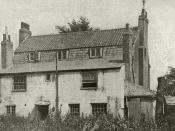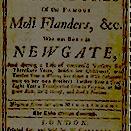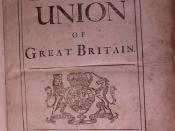A Portrait of a Criminal Daniel Defoe's Moll Flanders paints the perfect portrait of a criminal. The novel illustrates all the steps that Moll goes through on her way to becoming a master thief. Moll's future is determined the instant she is born. She is born with greed instilled upon her. Then she learns how to manipulate others. Later, in her teens, she develops vanity. After the loss of her first love, she develops a cold heart. Then when she digresses into poverty she becomes immoral. Thus with these characteristics: greed, vanity, manipulation, a cold heart, and immorality, Defoe creates the perfect criminal.
Moll's character is ultimately based upon greed. Moll's greed leads her to prostitution, thievery, and moral disintegration. Beginning early in the novel, Moll develops an aversion to work and wishes to become a gentlewoman. However, Moll's vision of a gentlewoman is different from what a gentlewoman is.
Moll believes that a gentlewoman is a woman who works for herself, rather than someone who does nothing. Nevertheless, she still desires to become a gentlewoman and eventually does. Her desire for money governs all her decisions, for example, her choice in husbands. Rather than choosing husbands based on love, she chooses them based on their affluence or social class. Also, Moll looks at everything in life based upon what it is worth rather than what it is. People, for example, are seen, as commodities to her and her relationship with them are business transactions.
Then in her youth, Moll learns the art of manipulation. Moll begins her use of the skill in order to get the nurse to take her into her home. Moll perfects her skill and begins to use it to get suitable husbands. After which, she uses it to pry on the emotions of the victims from whom she steals. She manipulates her son in order to get an inheritance. Moll even manipulates a priest in order to get him to persuade the judge to change her sentence.
Then in her teens, Moll becomes very vain. By listening to all the women telling her how handsome she is, she comes to believe it. Moreover, in no time at all, she believes that every man wants her. As Moll continues to age, she continues to believe how handsome she is. Her vanity also contributes to her prostitution. Moll is handsome, but not as handsome as she allows herself to believe.
After the loss of her first love, Moll gets a cold heart. Moll's first love only thought of her as a whore, not a suitable wife. Then when her love's eldest brother wished to marry her, her love tells her to marry him. After which Moll's heart turns cold. Her feelings towards men turn in to feelings for their money and social position. She even has a cold heart to her children. Moll never thinks twice about leaving all of her children in poverty, or worse circumstances.
Then after sinking into the depths of poverty, Moll begins lose all her morality. At first, she becomes a prostitute, but she has grown to old and unattractive to make a living off it. Then Moll hits a rock bottom when she begins stealing. She thinks that she is always right and others are wrong. For example, she steals from an innocent child and thinks that it is the fault of the parents for leaving their child alone. Moll even tricks a priest into thinking that she has converted and repented for her crimes. However, the only thing Moll is sorry about is having been caught.
Defoe's creates a perfect criminal through Moll. She does not care about her ten plus children whom she left on the street. Moll easily walks away from one husband to another. In addition, Moll thinks that her good looks will get her anywhere in life. Another asset Moll has is her appeal to people's emotions to get what she wants. Above all else, Moll has an overwhelming desire for money. Moll is the perfect criminal because she has no remorse for her crimes, a cold heart, a vain view of life, manipulation skills, and a desire for money.





